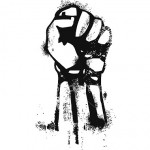 There are interesting developments in the Middle East as of late, primarily in the Egyptian protests that ultimately led to the removal of Hosni Mubarak from power.
There are interesting developments in the Middle East as of late, primarily in the Egyptian protests that ultimately led to the removal of Hosni Mubarak from power.
The mainstream media has portrayed it as largely a scare story – what will result from all this unrest? What will the Egyptian state look like after this revolt? Order must be restored, a new government must be formed.
But of more interest to me is the dialogue on the pro-liberty side, primarily in the anti-state camp. Many Anarcho-Capitalists are excited about the spectacle of the people rising up against the state. There is an atmosphere of hope in the idea that the people are casting off their rulers.
But I see it differently, from a systems/evolutionary view.
First, it’s worth addressing why I put the word “revolution” in irony quotes. It’s because we should think about what revolution actually means. It implies returning to some previous place. The natural state of individual liberty will not be realized by returning to some previous state of rule by the few over the many. It will require an evolution, a passage from the barbaric to the enlightened.
In the American context, those that advocate for a revolution in the present sense idealize a return to the State as supposedly constrained by the Constitution. As Lysander Spooner makes clear in The Constitution of No Authority, the Constitution either gave us the tyranny we live under today, or was powerless to prevent it. I’ll take the former.
The fallacy is in the idea of government itself. Save for a pitifully small minority, the masses of the Egyptian people aren’t taking a stand against being ruled – they’re taking a stand against the present ruler. While they’ve succeeded in removing one tyrant, they’re only asking for a more “moral” one to replace him. The most recent protests come from the vast population of government employees, demanding a pay raise so that they may have a larger share of the looting of their neighbor.
Perhaps, as many have speculated, they’ll succeed in getting a “democracy.” If so, they will only succeed in putting into place the most advanced form of control and extortion that the state has devised. In democracy, they’ll only enslave themselves more willingly because they believe “we are the government,” and when government fails, it’s their own fault.
Either way, they will not have escaped the fallacy that order in society is a product of a State holding a monopoly on violence.
So the way I see it, “revolution” will have to complete many more cycles before humankind understands the hamster wheel in which they’ve been spinning for what it is.
Here’s the good news: In all systems, the more interconnectivity, the faster these cycles of change turn. Interconnectivity changes the rate of change – that is to say, it is an exponential function. We can’t look at the rate of change in the past and expect some long, linear progression that follows that trend.
The Internet has changed the game, and its effects on the evolution of human society are in the early stages of infancy. Oppressed people can now see the world outside the control of the state they live under, and begin to ask why they shouldn’t be more free. They can read ideas about individual liberty that weren’t in their state-programmed education system and ask real, critical questions about the premise that anyone should be ruling them in the first place. And perhaps most importantly, the time period between revolutions will be shorter – compressing the mistakes into a shorter time frame and making them more obvious, and the history will not be written by the State that replaced the previous one.
This is why all States desire the ability to shut down the Internet at their command.
As these cycles shorten, the lessons become increasingly obvious. We “revolted” against one tyrant, only to replace him with another. We tried “democracy” and found it simply a fraud in which we are allowed to participate in the election of our rulers, but we were still ruled.
To paraphrase W. Edwards Deming, one day our time will be looked back upon as a historical curiosity – an age of mythology in which individuals were enslaved to the idea that they needed rulers, and they allowed – nay, advocated – an institution to hold a monopoly on the use of violence while naively believing that the individuals who sought a seat in that power center would act “selflessly” in the interest of others, not to advance their own agenda of power and control.